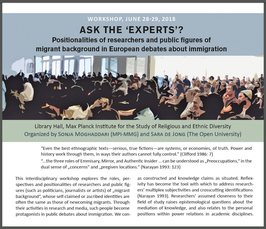"Ask the ‘Experts’? Positionalities of researchers and public figures of migrant background in European debates about immigration"
Workshops, conferences 2018
- Start: Jun 28, 2018 09:00 AM (Local Time Germany)
- End: Jun 29, 2018 03:45 PM
- Location: MPI-MMG, Goettingen
- Room: Library Hall

For more details please contact esser(at)mmg.mpg.de.
“Even the best ethnographic texts—serious, true fictions—are systems, or economies, of truth. Power and history work through them, in ways their authors cannot fully control.” (Clifford 1986: 7)
“...the three roles of Emmisary, Mirror, and Authentic Insider … can be understood as „Preoccupations,“ in the dual sense of „concerns“ and „pregiven locations.“ (Narayan 1993: 123)
This
interdisciplinary workshop explores the roles, perspectives and
positionalities of researchers and public figures (such as politicians,
journalists or artists) of „migrant background“, whose self-claimed or
ascribed identities are often the same as those of newcoming migrants.
Through their activities in research and media, such people become
protagonists in public debates about immigration. We consider the
peculiar place they inhabit in social hierarchies by examining their
changing identifications, as well as their engagement with issues of
representation and brokerage, research ethics and knowledge production.
The workshop seeks to contribute to the reflexive turn in anthropology,
and offer new insights into the way difference in post-migratory Europe
is confirmed, contested and (de-) constructed.
What are the stakes of being granted or asserting voice in debates about immigration against the backdrop of historical precedents and across different national contexts? Seeking to confront insider perspectives on migration in research and media, the workshop asks how public figures and researchers experience and engage with multiple identifications. How do they/we relate to and reflect on their/our dealings with newcomers? What are the challenges to their/our contribution to migration theory and policy?
Since the “postmodern turn” in the social sciences in the 1980s, objectivity is increasingly becoming recognized as constructed and knowledge claims as situated. Reflexivity has become the tool with which to address researchers’ multiplex subjectivities and crosscutting identifications (Narayan 1993). Researchers’ assumed closeness to their field of study raises epistemological questions about the mediation of knowledge, and also relates to the personal positions within power relations in academic disciplines. The role of the researcher – as a knowledge and cultural broker – connects to debates on representation in the study of migranticized public figures and their participation in public and social media. In both professional contexts, positionalities related to multiplex identities are constructed in the face of hegemonic struggles among co-ethnics and in the wider society (Werbner 1991).
Questions of accountability, authenticity and legitimacy, as well as ethical considerations concerning data collection, interpretation, representation and publication are particularly relevant when it comes to highly politicized issues such as contemporary immigration in Europe (Cabot 2016). Tracing how, and under which conditions, researchers and public figures of migrant background decide on the content of their scientific and media outputs; how they weigh the effects on the readership; and deal with their public after-life (Fassin 2015) can provide us with broader insights about how the perception of difference evolves in contemporary European societies of immigration.